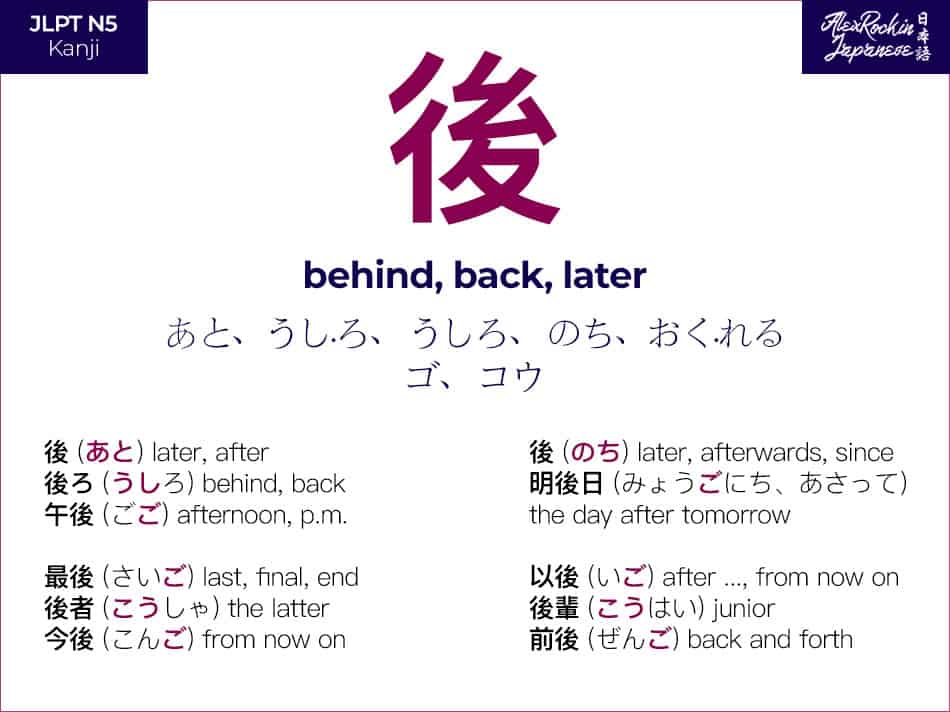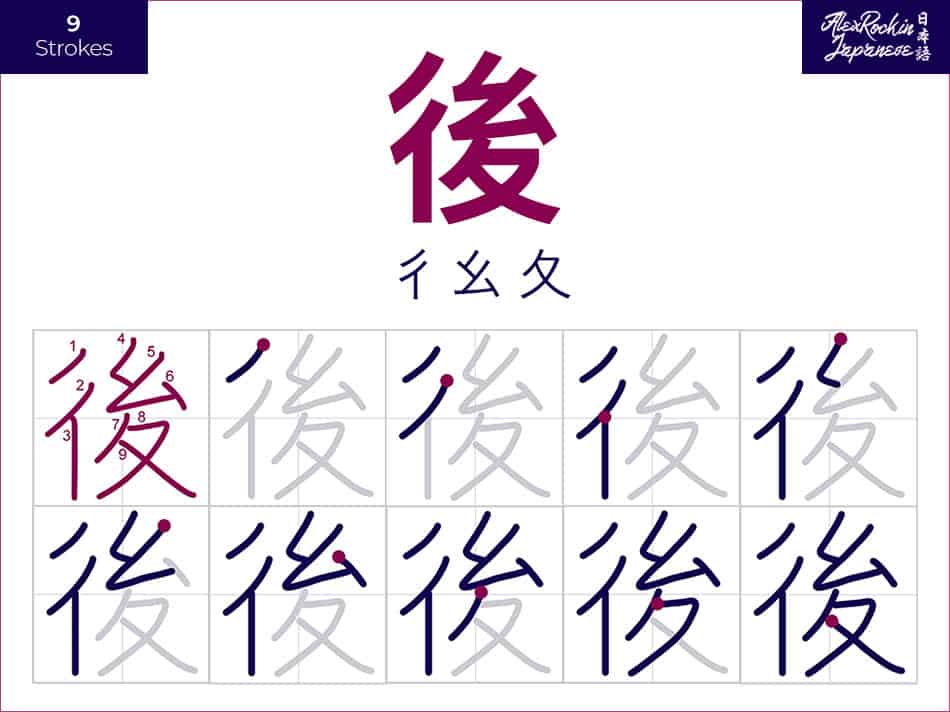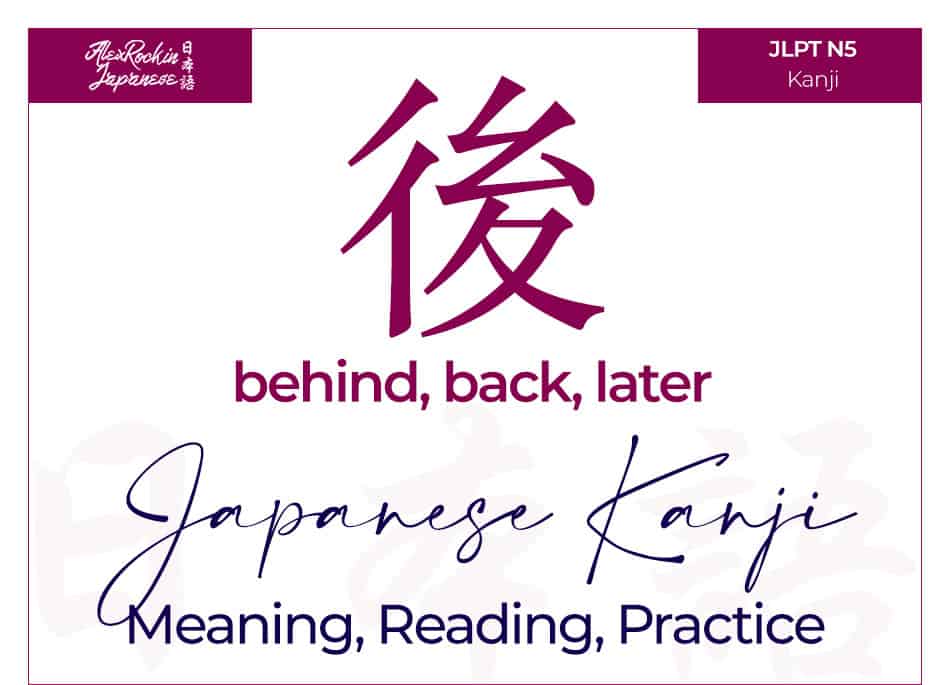When first seeing the Japanese kanji 後 in your JLPT N5 kanji list you might think that it is one of the more difficult characters to learn. However, the meanings and readings of 後 are actually pretty straight forward.
後 is the Japanese kanji for “later” or “behind”. It is best to remember the kanji as 後 (ato) meaning “later” and 後ろ (ushiro) meaning “behind”. In kanji compound words its common reading is “go”. However, when it is the first kanji it is usually read as “kou”. The stroke count for 後 is 9.
In my study notes below, you will find everything you need to know about 後 including all the common words you need to know for the JLPT tests. You can also learn or practice how to write the kanji and test your knowledge in the kanji practice and review section at the end.
Kanji Overview & Meaning

Meaning: behind, back, later
訓読み: あと、うし.ろ、 うしろ、 のち、おく.れる
音読み: ゴ、 コウ
Kunyomi: ato, ushi.ro, ushiro, nochi, oku.reru
Onyomi: go, kou
Strokes: 9
JLPT Level: N5
Jōyō Kanji: Grade 2
Frequency in Newspapers: 26 of 2500
How to Write

Strokes: 9
Radical: 彳 step, loiter, going man (no. 60)
Kanji Parts: 彳 (3 strokes), 幺 (3 strokes), 夂 (3 strokes)
Similar Looking Kanji: 復, 係, 孫, 浚, 俊, 従
JLPT Vocabulary List
JLPT N5
後 (あと, ato) after…
後で (あとで, ato de) later
後ろ (うしろ, ushiro) back, behind
午後 (ごご, gogo) afternoon, p.m.
JLPT N4
最後 (さいご) last, final, end
JLPT N3
後者 (こうしゃ) the latter
今後 (こんご) from now on, hereafter
後 (のち) later, afterwards, since, in the future
明後日 (みょうごにち、あさって) day after tomorrow
JLPT N2
以後 (いご) after …, after this, from now on, hereafter
後輩 (こうはい) junior at work or school, younger people, younger student
前後 (ぜんご) front and rear, before and behind, back and forth, before and after, around, about, approximately
直後 (ちょくご) immediately following
JLPT N1
明後日 (あさって) day after tomorrow
後回し (あとまわし) putting off, postponing
後悔 (こうかい) regret, repentance, remorse
後退 (こうたい) retreat, recession, backspace
産後 (さんご) postpartum, after childbirth
明々後日(しあさって) in three days, two days after tomorrow
背後 (はいご) back, rear, background, behind the scenes
Readings
Kunyomi
あと
後 (あと) behind, rear, later, after, remainder, the rest, more (as for example in “5 more minutes”), left, also, in addition, descendant, successor, heir
後回し (あとまわし) putting off, postponing
後押し (あとおし) pushing, backing, boosting, supporting, pushing from behind (for example a cart, etc), pusher
後戻り (あともどり) going backward, turning back, backtracking, doubling back, retrogression, relapse, returning to a bad state
後片付け (あとかたづけ) tidying up, cleaning up, putting in order, clearing up, clearing away
後始末 (あとしまつ) settlement (of affairs), cleaning up afterwards
うし.ろ
後ろ (うしろ) behind, back, rear
後ろ向き (うしろむき) back-facing, backwards, backward-looking, retrogressive, retrospective, turning one’s back to
後ろ姿 (うしろすがた) appearance from behind, retreating figure
のち
後 (のち) later, afterwards, since, in the future, after one’s death
晴後曇 (はれのちくもり) sunny then cloudy, cloudy after a clear day
おく.れる
後れる (おくれる) to be late, to be delayed, to fall behind schedule
後れ (おくれ) delay, lag, postponement, falling behind
Onyomi
ゴ
~後 (ご) after …
午後 (ごご) afternoon, p.m.
最後 (さいご) last, final, end, conclusion, the last…, the final…., most recent
今後 (こんご) from now on, hereafter
明後日 (みょうごにち, あさって) day after tomorrow
以後 (いご) after this, from now on, hereafter, since (then), thereafter
前後 (ぜんご) front and rear, before and behind, back and forth, before and after, around, about, approximately, just when, around the time of
直後 (ちょくご) immediately following, directly after
産後 (さんご) postpartum, after childbirth
背後 (はいご) back, rear, background, behind the scenes
コウ
後者 (こうしゃ) the latter
後輩 (こうはい) junior at work or school, younger people, younger student
後悔 (こうかい) regret, repentance, remorse
後退 (こうたい) retreat, falling back, moving backwards, retraction, recession, backspace
後半 (こうはん) second half, the latter half
後部 (こうぶ) rear, stern
後世 (こうせい) posterity, future life, life to come
後方 (こうほう) behind, in the rear, in back
後援 (こうえん) support, backing
後続 (こうぞく) succeeding, following, next
後期 (こうき) latter period, second half, late stage, third trimester, second semester
後天的 (こうてんてき) a posteriori, acquired
Exceptional Readings
あさって
明後日 (あさって) day after tomorrow
明々後日(しあさって) in three days, two days after tomorrow
Practice & Review
Easy
1. この後、プールに行きます。
a) ごう
b) おと
c) あと
d) おく
2. _____ を見て!
a) 後る
b) 後ろ
c) 後そ
d) 係れ
3. 午後に会いましょう。
a) ごご
b) ごごう
c) いご
d) ごうご
4. 父は子どもの後ろに立ちます。
a) before
b) later
c) after
d) behind
5. 後でテレビを見ます。
a) after
b) afternoon
c) later
d) before
6. 午後に映画を見ませんか。
a) in the afternoon
b) in the morning
c) at noon
d) around noon
7. これがサイゴです。
a) 最初
b) 再後
c) 最後
d) 最高
8. 学校の_____何をしませんか?
a) 明日
b) 復
c) 午後
d) 後
9. ええ?こんなつまらないのに最後まで見たの?
a) from the start
b) until the end
c) in the end
d) until the afternoon
10. あの高いビルの後ろに駅があります。
Translations
- この 後、プール に いきます。
_____ this, I will go to the swimming pool. - うしろ を みて!
Look _____ you! - 午後 に あいましょう。
Let’s meet _____. - ちち は こども の 後ろ に たちます。
The father stands _____ the child. - 後 で テレビ を みます。
I will watch TV _____. - 午後 に えいが を みません か。
Shall we watch a movie _____? - これ が 最後 です。
This is the _____ one / time. - がっこう の あと なに を しませんか か?
What shall we do _____ school? - ええ?こんな つまらない のに 最後 まで みた の?
Huh? You watched it _____ even though it was that boring? - あの たかい ビル の 後ろ に えき が あります。
There is a station _____ that tall building.
Answer Key
- c) 後, あと, after
- b) 後ろ, うしろ, behind
- a) 午後, ごご, in the afternoon
- d) 後ろ, うしろ, behind
- c) 後, あと, later
- a) 午後, ごご, in the afternoon
- c) 最後, さいご, last
- d) 後, あと, after
- b) 最後, さいご, until the end
- 後ろ, うしろ, behind
Intermediate
1. 晴れ後曇りでした。
a) あと
b) のち
c) あっと
d) のっち
2. 犬の方が猫より好きです。なぜなら前者の方が_____よりかわいいだからだ。
a) 後者
b) 前者
c) 後輩
d) 前後
3. 明後日もし雨が降れば、東京に帰ります。
a) みょうこにち
b) あさて
c) あさって
d) みょうごうにち
4. 船が前後にひどく揺れた。
a) ぜんこ
b) ぜんご
c) まえご
d) せんご
5. 今後何が起こるか分からない。
a) in the afternoon
b) hereafter
c) later
d) in the end
6. 10時以後に人に電話するにはダメだろう。
a) いがい, except
b) いこう, after
c) いご, after
d) いごう, hereafter
7. その新しい美術館が明後日休業してしまう。
a) あさつて, the day after tomorrow
b) みょうごにち, the day after tomorrow
c) みょうごにち, the day before yesterday
d) みょうごうにち, in three days
8. 彼は高校卒業直後に入社した。
a) ちょくご, immediately following
b) すぐご, right after
c) ちょくごう, right now
d) ちよくご, immediately following
9. 私が所属していたテニス部の後輩の試合を見に行った。
10. それ以後、あの有名な絵の所在は不明のままだった。
Translations
- 晴れ 後 くもり でした。
It was cloudy _____ being sunny. - 犬 のほうが 猫より 好きです。なぜなら ぜんしゃ のほうが こうしゃ より かわいい だから だ。
I like dogs better than cats because the former are cuter than _____. - 明後日 もし 雨がふれば、東京に帰ります。
If it rains _____, I’ll go back to Tokyo. - 船が 前後に ひどく ゆれた
The ship rocked heavily _____. - 今後 何が おこる か 分からない。
You don’t know what is going to happen _____. - 10時 以後に 人に 電話する には ダメ だろう。
You shouldn’t call people _____ ten (at night). - その 新しい 美術館 が 明後日 きゅうぎょう してしまう。
The new art museum will be closed _____, unfortunately. - 彼は 高校そつぎょう 直後に にゅうしゃ した。
_____ his high school graduation he joined the company.
He joined the company _____ his high school graduation. - 私が しょぞく していた テニスぶの 後輩 の 試合を見に行った。
I went to see the match of my _____ from the tennis club I used to belong to. - それ以後、あの有名な絵の しょざい は ふめい のまま だった。
_____ the whereabouts of the famous picture have been unknown.
The whereabouts of the famous picture have been unknown _____.
Answer Key
- b) 後, のち, after
- a) 後者, こうしゃ, the latter
- c) 明後日, あさって, the day after tomorrow
- b) 前後, ぜんご, back and forth
- b) 今後, こんご, hereafter
- c) 以後, いご, after
- b) 明後日, みょうごにち, the day after tomorrow
- a) 直後, ちょくご, immediately following (or immediately after)
- 後輩, こうはい, junior (or juniors)
- 以後, いご, since then
Related
~の後
後で
たが最後


